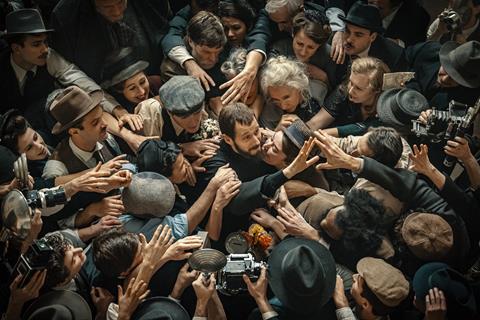Benjamin Lavernhe takes the title role in this epic sweep through the social problems of modern France

Dir: Frederic Tellier. France. 2023. 138 mins
French priest Abbé Pierre devoted his long life to championing the poor and becoming the voice of the voiceless. Did he do enough to leave the world a better place? Frederic Tellier’s sweeping, old-fashioned biopic Abbé Pierre - A Century Of Devotion seems intent on proving there are no worries on that score. The sweeping saga of Abbé Pierre’s inspirational life offers handsomely crafted storytelling aimed at a mainstream audience and could match the commercial impact of such recent French biopics as De Gaulle (2020), Eiffel (2021) and Simone, Le Voyage Du Siecle (2021).
Sweeping, old-fashioned biopic
Following hot on the heels of Tellier’s 2022 box-office hit Goliath, L’Abbé Pierre uses a lengthy flashback structure that first alights in a monastery in 1937. The frail, sickly Henri Groues (Benjamin Lavernhe) collapses and is subsequently informed that he doesn’t have the physical strength and fortitude to continue as a capuchin monk. There is a suggestion that he might be more useful elsewhere. We then move forward to the Second World War, where Groues is working with the French resistance and facing the loss of those closest to him. In the Lyon of 1943, he meets Lucie Coutaz (Emmanuelle Bercot, previously in Goliath) who becomes his friend and conscience. She also forges the papers that provide him with a new identity as Abbé Pierre.
The first half of the film is the most surefooted, finding pace and purpose in the activities of the wartime resistance. Cinematographer Renaud Chassaing impresses with the dark, shadowy scenes of nighttime subterfuge and the icy grip of winter in the mountains as Groue helps others to escape. Tellier makes effective use of newsreel and archive footage to link Abbé Pierre’s experiences to global events. We witness the joyous liberation of Paris and the dropping of the Atom bomb.
The post-war years find Abbé Pierre increasingly devoted to the poor and homeless, berating the bourgeoisie and imploring them to share their wealth. Establishing the Emmaus movement leads to a network of shelters and emergency housing to support those who have nothing. Archive footage reveals Paris in the winter of 1954 when the homeless froze to death on the streets.
The second half of the film guides us through Abbé Pierre’s good deeds and popularity. His celebrity status is conveyed through impassioned speeches that bring cheering crowds to their feet. Crisp editing from Valerie Deseine captures the whirl of emotion and inspiration whilst split-screen is used to underline the growing fame of Abbé Pierre.
Tellier has a lot of ground to cover and increasingly it feels as is we are galloping through edited highlights of Abbé Pierre’s life. Triumph and disaster are met with equal resolve as he survives illness and a shipwreck. He continues to wage war on poverty despite the suspicion that he has been able to change nothing. He rages against Le Pen in the 1990s and continues to deliver food to the homeless on the streets of Paris in 2003, four years before his death.
Tellier does manage to keep a focus on Abbé Pierre’s guiding principles of caring for each other, fighting prejudice and sharing with those who have nothing. He ends the film with images of those sleeping rough in modern day France and the news that the work of the Abbé Pierre Foundation continues.
There are moments when Tellier does succeed in capturing the emotions, from the solemn funeral of a baby who has frozen to death to the impassioned speeches in which you sense that Abbé Pierre might just have been the one to change the world. He is aided immeasurably by the central performance of Benjamin Lavernhe (currently in Cannes opener Jeanne Du Barry) who invests Abbé Pierre with a sincerity, fiery conviction and humbling doubts that help to render this saintly figure as a flawed, intriguing and admirable human being.
Production companies: SND, WY Productions.
International sales: SND, ramy.nahas@snd-films.fr
Producers: Wassim Beji, Thierry Desmichelle
Screenplay: Olivier Gorce, Frederic Tellier
Cinematography: Renaud Chassaing
Production design: Nicolas de Boiscuille
Editing: Valerie Deseine
Music: Bryce Dessner
Main cast: Benjamin Lavernhe, Emmanuelle Bercot, Michel Vuillerimoz verne






![The Brightest SunScreen[Courtesy HKIFF]](https://d1nslcd7m2225b.cloudfront.net/Pictures/274x183/3/5/0/1448350_thebrightestsunscreencourtesyhkiff_312678.jpg)















![The Brightest SunScreen[Courtesy HKIFF]](https://d1nslcd7m2225b.cloudfront.net/Pictures/100x67/3/5/0/1448350_thebrightestsunscreencourtesyhkiff_312678.jpg)

